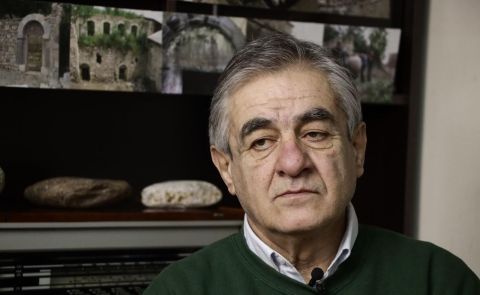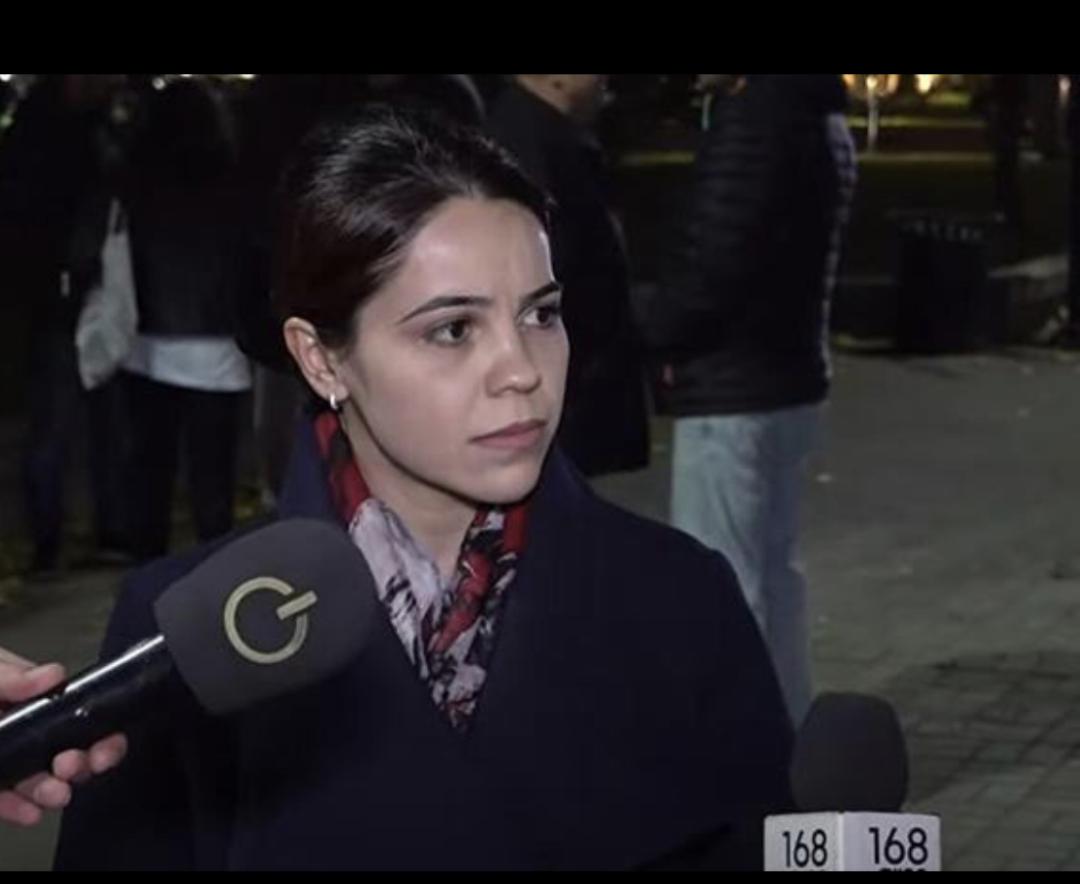
Tatevik Hayrapetyan: The Problem with Drawing a Border Without a Map

"Good fences make good neighbors", says the proverb. But the border being drawn between Armenia and Azerbaijan divides Armenians as much as it divides the two countries.
On April 19, Armenian Deputy Prime Minister Mher Grigorian and his Azerbaijani counterpart Shahin Mustafayev jointly announced a preliminary agreement on border delimitation. The two parties started from the Tavush region, with the Armenian side handing over four villages along the northeastern border with Azerbaijan. To this end, the Armenian armed forces were mobilized to vacate the conceded territory.
The EU's Special Representative for the South Caucasus, Toivo Klaar, soon hailed the agreement as "encouraging," while the German Foreign Ministry noted that it “removes a major obstacle on the way to a peace agreement.” Residents of the affected Tavush region took to the streets, blocking the Armenia-Georgia highway in protest. This despite the fact that the government has appointed a demarcation commission headed by regional governor Hayk Ghalumyan. The protests have spread to Yerevan.
To understand the reaction to the agreement, Caucasus Watch spoke with Tatevik Hayrapetyan, a historian and member of parliament elected in 2018 on the list of the ruling Civil Contract Party. She specializes in Azerbaijani foreign policy, state culture and history.
There is an agreement between Azerbaijan and Armenia that is hailed as a prelude to peace. This has stirred demonstrations in Armenia. Can we begin by describing what has been agreed?
Let’s begin with the point that this demarcation has been negotiated under Azerbaijan’s threat of war, demanding control over Tavush. Two weeks prior to this agreement on the border villages – which the Armenian government portrays as delimitation and demarcation – Azerbaijan’s Ministry of Defense was spreading disinformation, blaming Armenians for provocations and aggression. They were threatening with violence. Let me remind you that this chain of events was confirmed by the European civilian mission in Armenia.
Meanwhile, Armenia’s PM Pashinyan was meeting with people living in bordering villages, expressing concerns that Azerbaijan might engage in further aggression. All these consultations and talks occurred under the looming threat of war.
The problem here is that if we are discussing border demarcation, then we need to refer to the maps upon which this process is based. However, there is no map that has been agreed upon by both sides; there is only a mention of the Alma-Ata Declaration, which is simply a declaration with no map attached. Therefore, in my view, it appears to be a unilateral concession by Armenia, which is being portrayed as a preventive measure against possible war. This brings us to another issue, namely the absence of a mediator.
Question: ‘whom will Pashinyan call upon if Baku initiates another aggression, following these unilateral concessions from Yerevan?’ Answer, ‘no one.’ Ultimately, Azerbaijan is securing a better position in negotiations by threatening the civilian Armenian population residing in those villages. The Armenian people have already witnessed over the past three years that all these unilateral concessions do not prevent war or aggression. On the contrary, they seem to encourage official Baku to come up with new demands, thus expanding their wish list even further.
You are opposing this agreement. In addressing opposition in the street, the government will often speculate as to “who” is instigating the demonstrations: Iran, Russia, the opposition, and variations of the fifth column narrative. Precisely what are the issues raised in Yerevan by way of criticism to what has been agreed?
Speaking frankly, I recently visited Tavush and spoke with people who are facing this new reality. Contrary to what the propaganda suggests, there is currently no widespread demand for Pashinyan's resignation. Instead, there is a strong demand to halt the process because, according to the terms of the deal, Azerbaijan stands to gain significantly while Armenia gains nothing.
Consider the situation of someone who learns that the graves of their relatives are slated to be handed over to Azerbaijan, or another person who discovers that the land they legally own and have built their home upon is to be ceded to Azerbaijan. It's understandable why people are taking to the streets—they see this process as threatening to make their lives unbearable.
Moreover, it's difficult to believe that Azerbaijan has genuinely changed its attitude towards the Armenian people, especially after the ethnic cleansing and forced deportation of Armenians from Nagorno-Karabakh. In sum, the primary focus of the meetings and demonstrations is in Tavush. While there are smaller, spontaneous actions in Yerevan – by the opposition – I don’t see Yerevan experiencing the same level of unrest as it did in 2018. The main goal of these actions is to ensure that ordinary citizens remain vigilant and prevent developments that could prove dangerous for Armenia.
The government will often argue that the price of peace is hard choices. You have unique access to both Azerbaijani and Armenian political discourse. In what ways is this a prelude to peace and in what ways it is not?
During a recent speech, President Aliyev made it clear that the ongoing process has nothing to do with peace. He explicitly stated:
“Border Delimitation and the peace agreement are two separate issues. I think, it would be wrong to conflate them and make one dependent on the other. For a very simple reason: our 1000 km border with Armenia – more or less – was under occupation for 30 years. From Kalbajar’s Murov mountain to the Araz River it is about 500km. In Soviet times, even when we had administrative borders, the land border between the Armenian Soviet Republic and the Azerbaijan Soviet Republic was blurred. The biggest part of the borderline is uninhabited, with mountains rising to 3,500 meters, covered with snow for nine months a year.”
Why did he say this? Because Azerbaijan has seized important positions and high ground during various conflicts: in May 2021, November 2021, and September 2022, during large-scale attacks against Armenia proper. Despite maps indicating that these territories belong to the Republic of Armenia, Azerbaijan shows no intention of returning them. Aliyev's statements aim to maintain ambiguity about the status of these territories. This starkly contrasts with the reality presented by the Armenian government.
In December 2022, Aliyev further asserted, “Armenia was never present in this region before. Present-day Armenia is our land.”
Azerbaijan’s propaganda portrays Armenia as “Western Azerbaijan,” especially after gaining control over Nagorno-Karabakh, devoid of its Armenian population. It's evident that Azerbaijan is not genuinely interested in building peace when they claim Armenia as their "homeland."
You have been part of the ruling coalition. You are now a critic. Can you identify what is your opposition? When you protest, who do you stand with and what for?
My main conceptual issue with PM Pashinyan and his team is that, in my view, when you politically accommodate the realities created by aggression and war, you essentially open a Pandora's box. By doing so, you implicitly accept that conflicts can be resolved through warfare, which is unacceptable. All regimes in Armenia were prepared for a mutually beneficial peace deal. As Aliyev admitted in his interview with Euronews, war is his “life mission." There is a fundamental disconnect.
Ultimately, if you acquiesce to all of Azerbaijan's demands, how can you expect to negotiate from a position of strength? How can you compel Azerbaijan to respect Armenia's territorial integrity if you relinquish all leverage towards Aliyev? This policy lacks coherence and logic.
Myself and several others who actively supported Pashinyan during the 2018 Velvet Revolution, we recently initiated a civilian movement called “Bell”. We protested last November and December, seeking to raise awareness about the escalating risk of war in the spring and the looming issue of the enclaves. We attempted to set up tents throughout the city to engage with people, but government policies hindered our efforts. Ultimately, we suspended our protests on the eve of the New Year due to a lack of sufficient outreach.
I firmly believe in pursuing the path of common sense and peace. There is no common sense in building peace under the shadow of war. Throughout history, I have not witnessed any instance where peace was achieved amidst gunshots and propagandist hatred. I am well-acquainted with Azerbaijan's state policies, and I do not believe that the current process will lead to genuine peace. I am confident that Armenia has many other options besides unilateral and illogical appeasement.
So, is this a “protest movement” destined to fizzle out or is there a constructive political narrative with a chance of changing things? In sum, are you in good company?
When our very small group of people were on the streets, we tried to present the narrative for the post-Pashinyan period. People want to see just a one-step solution, which is not appropriate in this situation. Unfortunately, the question of what happens when Pashinyan resigns is very complicated and doesn’t have a straightforward answer. As I said, for the moment, there is no clear demand for his resignation.
Interview conducted by Ilya Roubanis
See Also


Irina Mamulashvili: Electoral Interference is a Playbook, not a Recipe

Giorgi Gakharia: The EU Should Engage Georgia Despite Its Democratic Backsliding

Peace or Capitulation? Shahverdyan on Armenia-Azerbaijan Agreement and the Nagorno-Karabakh Crisis

Ali Mousavi Khalkhali: Iran Will Avoid Conflict in the Caucasus

